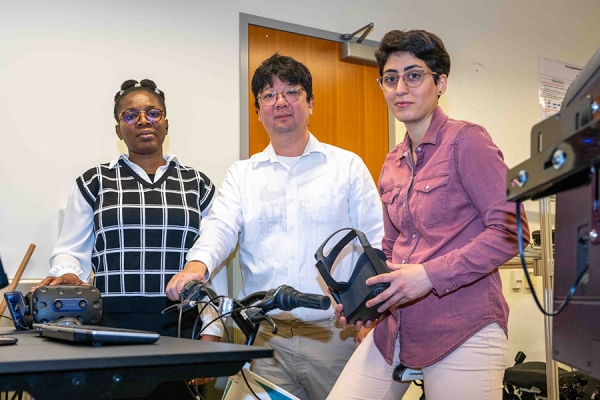 Professor Eunsik Kim (centre) congratulates Ilfeoma Michael and Elnaz Akhavan Rezaee on student research awards they received at the Association of Canadian Ergonomists conference.
Professor Eunsik Kim (centre) congratulates Ilfeoma Michael and Elnaz Akhavan Rezaee on student research awards they received at the Association of Canadian Ergonomists conference.
Students in mechanical, automotive and materials engineering professor Eunsik Kim’s Occupational Safety and Ergonomics research lab are winning notice for their work to apply virtual reality to address issues in the physical world.
Master’s student Ifeoma Michael and doctoral student Elnaz Akhavan Rezaee each received awards for their presentations at the Association of Canadian Ergonomists conference, “Optimizing Human Performance,” in Calgary in October.
Dr. Kim said the awards are a testament to their hard work and the meaningful impact of their studies.
“The innovative research conducted by Ifeoma Michael and Elnaz Akhavan Rezaee truly exemplifies the forward-thinking approach we champion in our lab,” he said. “Their dedication to integrating virtual reality with ergonomics and transportation safety not only advances academic understanding but also holds remarkable potential for real-world applications. I am incredibly proud of their achievements and look forward to their ongoing contributions to the field.”
Michael’s research offers a glimpse of a future where professionals can work more efficiently, no matter where they are.
“The future of work is changing,” she noted. “People no longer need to be confined to a desk. With the right tools, like VR, we can empower workers to achieve their full potential while on the go.”
Her paper, entitled “Investigating the Effects of Working in Virtual Reality Environment on Office Workers’ Performance,” explores the potential for virtual workstations to improve work-life balance, productivity.
Rezaee’s project “Cyclists’ Behaviour Towards Safety: A Review Study” is making waves in the field of cyclist safety with a comprehensive research project that leverages cutting-edge technology to improve biking infrastructure and promote healthier, more sustainable transportation options.
Her dissertation focuses on bridging the gap between the potential for bicycling to improve health and traffic congestion and the hesitation of riders to commute by bike due to safety concerns.
“After the COVID-19 pandemic, there was a noticeable increase in interest in cycling as people turned to healthier outdoor activities,” Rezaee said. “However, the actual use of bikes remains low, especially for commuting purposes. Safety concerns, particularly in cities with heavy traffic, are a significant deterrent.
“That’s why my research is focused on creating solutions that will encourage more people to use bikes regularly — both for their health and to help reduce carbon emissions.”
A key innovation in hre research is the development of a virtual reality bike simulator, which will allow Rezaee to simulate different cycling scenarios and analyze how varying factors — such as road design, traffic, and cyclist behaviour — affect safety. The technology will test potential interventions and explore how changes to the environment could make cycling more appealing and safer for everyday use.
“Cycling is not just a way to reduce carbon footprints,” Rezaee said. “It’s also a way to reduce anxiety, depression, and stress over time. The more people use bikes, the better it will be for both their mental health and the environment.”
